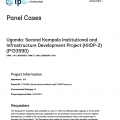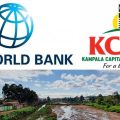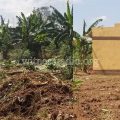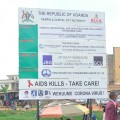A community kickboxing academy marked for demolition by the Kampala Capital City Authority.
In 1998, Patrick Mwenza moved to the Kawaala settlement in Kampala, Uganda, where he built his family home and a few rental properties for additional income. But Mwenza — whose name has been changed to protect his identity — said that in 2013 the Kampala Capital City Authority tried to take his land to make way for a development project.
Though Mwenza, now 49, managed to keep his land after rejecting the compensation offered by the authority, he says some of his properties were destroyed during the diversion of the local Lubigi drainage channel, and he did not receive any financial assistance to rebuild them.
Seven years later, on Dec. 3, 2020, Mwenza and his neighbors woke up to find KCCA representatives accompanied by armed guards, distributing eviction notices around their village and placing a red “X” on many structures, which they said were intended for demolition to accommodate the expansion of the Lubigi drainage channel.
Though Mwenza’s property wasn’t marked with the dreaded “X,” he said he did find a pole in the middle of his compound, which marked where the next phase of the channel’s construction will begin — indicating that he should soon expect another eviction notice.
The expansion of the Lubigi drainage channel is part of the second phase of the World Bank’s Kampala Institutional and Infrastructure Development Project, KIIDP-2, a project with $175 million committed in the pipeline to enhance urban mobility.
During the first phase, in 2014, authorities constructed a channel diversion which Accountability Counsel — an international civil society organization that advocates for communities harmed by projects like this — said ran through the land of many local residents in Kawaala, as well as cut others off from easy access to schools and basic services.
“This is a very stark example of failure to meet the World Bank’s own safeguard policies.”
— Caitlin Daniel, senior communities associate, Accountability Counsel
KIIDP-2 will expand on this channel diversion, widening it significantly. It is expected to lead to the eviction of more than 100 families across an area that is more than 1.5 miles long and 230 feet wide.
Accountability Counsel says neither KCCA nor the World Bank provided community members in Kawaala Zone II with adequate information on compensation and resettlement last year — as required by World Bank policies before issuing eviction notices.
In response to this, the community filed a complaint about the project to the World Bank’s Inspection Panel with the support of local NGOs, Witness Radio, and Accountability Counsel. The panel registered the case last month.
Caitlin Daniel, senior communities associate at Accountability Counsel, said many of the issues plaguing the first phase of the project haven’t been dealt with, and that — despite KCCA having had years to organize a resettlement process — the Kawaala Zone II community has been largely excluded from the process.
The organization believes that KCCA has been taking advantage of the community’s lack of awareness, driving affected community members through a rushed resettlement process — prioritizing project timelines over the livelihoods and the well-being of affected people and its equitable implementation.
Robi Mosenda, communities associate at Accountability Counsel in Kenya, alleged that KCCA has also used unscrupulous tactics such as threats, misinformation, and enforced surveys “to drive out this community.”
“There have been allegations of extortion and people asking for bribes to get higher values or figures for compensation,” he said, adding that, although many community members are illiterate, they’ve been asked to sign documents only to be never given copies. “Most of them just figured that this is a government agency and they will do whatever they want to do and we don’t have recourse against them.”
In the midst of all this, community members and civil society groups say that the World Bank has been largely absent, leaving KCCA frequently unsupervised. Community members aren’t clear about their rights in relation to a World Bank-funded project, Mosenda said, because nobody gave them that information.
“This is a very stark example of failure to meet the World Bank’s own safeguard policies,” Daniel explained. “These commitments that they have made to ensure that community members are not resettled without first receiving compensation and resettlement assistance — enough to make sure they are not any worse off than they were before the project began, and that just really clearly didn’t happen.”
World Bank attaches too many strings to COVID-19 aid, report says
A report from the Center for Global Development is urging the World Bank to remove its normal policy reform conditions during the global health crisis to get support to governments faster.
She added that COVID-19 further complicated the process, with World Bank personnel reluctant to travel to project sites. “But community members really strongly feel if the World Bank were there in person then the KCCA’s actions would be improved,” she said.
A representative from the World Bank’s country office in Uganda said that the bank cannot comment on an ongoing deliberation by their inspection panel.
Meanwhile, KCCA insists that the allegations leveled against the authority are false.
“It’s supposed to be a better place after we have finished the channel but because some people want a little money and their recognition, they hype it,” said KCCA spokesperson Daniel NuweAbine. “It is politics and the selfishness of individuals that want to keep our cities and our people … behind.”
NuweAbine claimed that the authority has “engaged and reengaged with the community,” and provided adequate compensation to those affected.
Those that have not been compensated, he said, illegally settled on the land after the first phase of the project — when the aforementioned compensations were already made — or bought land from owners who had previously received compensation. He blamed lawyers and civic groups for wanting “to be looked at as saviors” and misleading the community about how much their properties are worth.
The Accountability Counsel’s Daniel challenged KCCA’s assertion, citing a person whose proposed compensation amount was so low that it wouldn’t even cover administrative fees to obtain the documents that proved they owned the land.
“We are not rebelling [against] the project but we want to be compensated and leave the land for the project to go on,” said one 42-year-old woman, who has lived in Kawaala her whole life.
Jeff Ssebaggala, Uganda’s country director at Witness Radio, said the project’s problem is that it wasn’t community-led from the beginning.
“Development should be community-led,” he said. “No poor community would fight a development project, but people are not included.”
Original Source: devex.com


































